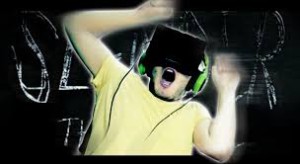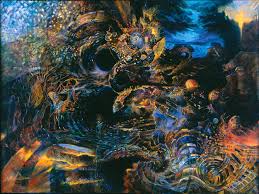Or tours through psychic lands rather than physical ones. Such journeys “Take no time” in our terms.

We have a storm. Weathermen or weather women speak of local conditions and merging air currents. We are in a realm where consciousnesses merge. A constant state of growth, expansion, and development. We can travel to many great universities of the mind.
Much of this is difficult to explain, for information and knowledge is constantly transformed — almost completely reborn, so to speak, through characteristics that are inherently a part of thought itself. Knowledge is changed automatically through the auspices of each consciousness who perceives it. It is magnified and yet refined. It is a constant language, yet one that transforms itself. We can exchange with each other a more complicated system of reality than any computer could handle. We do not understand or perceive the ways in which our reality contributes to the foundation of the mass-world reality that we experience. Unconsciously, each individual participants in forming that world. The primary encounter must be a subjective inner one, and intersection of consciousnesses that is then physically experienced.

The encounters themselves occur in a Framed-mind-3 environment. That framework of course, again in terms of an analogy, exists another step away from our own Framed-mind-2. I do not want to get into a higher-or-lower hierarchy here, but the frameworks represent spheres of action. Our encounters initially take place, then, beyond the sphere that deals exclusively with either our physical world or the inner mental and psychic realm from which our present experience springs.
Like as motes of dust might be swept along with a brisk autumn wind from one area to another. We are carried above the land of our usual perception so that portions of us glimpse subjective states. These arouse our curiosity even when consciously we are not aware of perceiving them. That curiosity acts as impetus.

Our intents and concerns, our interests, our needs and desires, our characteristics and abilities, directly influence our material, for they lead us to it to begin with.
We want to make the material workable in our world — a natural and quite understandable desire. The proof is in the pudding, and so forth. Yet of course we are also participators in an immense drama in which the main actions occur outside of our world, in those realms from which our world originated — and we are, foremost, natives of those other realms, as each individual is; each being is.

Those realms are far from lonely, dark, and chaotic. They are also quite different from any concept of nirvana or nothingness. They are composed of ever-spiraling states of existence in which different kinds of consciousnesses meet and communicate. They are not impersonal realms, but are involved in the most highly intimate inter-actions. Those interactions exist about us all the while, and I would like us in our thoughts to aspire toward them, to try to stretch our perceptions enough so that we become at least somewhat aware of their existence.
These frameworks, while I speak of them separately, exist one within the other, and each one impinges upon the other. To some extent we are immersed in all realities.

If we could, try to sense this greater context in which we have our being. Our rewards will be astonishing. The emotional realization is what is important, of course, not simply an intellectual acceptance of the idea. Do not forget the vaster context. Which will trigger responses on our part, increasing still further the scope of knowledge that we can receive.
In our world knowledge must be translated into specifics, yet we also deal with emotional realities that cannot be so easily deciphered. In the atmosphere now, there are hints of those undecipherable yet powerful realities that will, in time, gradually be described in verbal terms that make sense to us.

According to our understanding, our own comprehensions and perceptions will bring other clues, either in the waking or the dream state. Keep our minds open for them, but without any preconceived ideas of how they might appear. Development triggers certain psychic activity that then triggers further growth.
To some extent Framed-mind-1 and 2 is of course an example of an entire idea, for we receive a good deal of information of physical life. Still they must be colored by our ideas of what physical lives are.

Even our concepts of creativity are necessarily influenced by Framed-mind-1 thinking, of course.
Acts of creativity best approach the workings of Framed-mind-2, for [those] acts always involve leaps of faith and inspiration, and the breaking of barriers.

When we are writing, we draw upon associations, memories, and events that are known to us and others, that perhaps we had forgotten but that suddenly spring to mind in answer to our intent and following our associations. When an artist is painting a landscape, he might unconsciously compare hundreds of landscapes viewed in the past in multitudinous, seemingly forgotten hues that splash upon the grass or trees, or as he seeks for a new creative combination. Art is his or her focus so that he draws from Framed-mind-2 all of those pertinent data that are necessary for his or her painting. Not just technique is concerned, but the entire visual experience of his or her life.
Framed-mind-2 involves a far vaster creative activity, in which our life is the art involved — and all [of the] ingredients for its success are there, available. When we are creating a product or a work of art, the results will have much to do with our idea of what the product is, or what the work of art is — so our ideas about our life, or life itself, will also have much to do with our experience of it as a living art.

If we believe in the laws of cause and effect, as accepted, or in the laws of polarity, as accepted, then we will be bound by those laws, for they will represent our artistic technique. We will believe that we must use them in order to, say, paint the living portrait of our life. We will therefore structure our experience, drawing to oneself from Framed-mind-2 only that which fits. We will not have the “technique” to attract other experience, and as long as we stick with one technique our life-pictures will more or less have a certain monotony.
Write and artist also bring more into his or her work than the simple ability to write or paint. In one way or another all of his or her experience is involved. When we pay attention to Framed-mind-1 primarily, It is as if we have learned to write simple sentences with one word neatly before the other. We have not really learned true expression. In our life we are writing sentences like “See Tommy run.” Our mind is not really dealing with concepts but with the simple perception of objects, so that little imagination is involved. We can express the location of objects in space, and we can communicate to others in similar fashion, confirming the physical obvious properties that others also perceive.

In those terms, using our analogy, the recognition of Framed-mind-2 would bring us from that point to the production of great art, where words served to express not only the seen but the unseen — not simply facts but feelings and emotions — and where the words themselves escaped their consecutive patterns, sending the emotions into realms that quite defied both space and time.
Now and then people have such moments, and yet each private reality has its existence in an eternal creativity from which, our world springs.

It is not as if that vaster reality were utterly closed to our perception, for it is not. To some extent it is everywhere apparent in each person’s private experience, and it is obviously stated in the very existence of our world itself. The religions, in one way or another, have always perceived it, although the attempt to interpret that reality in terms of the recognized facts of the world is bound to distort it.
Our world, then, is the result of a multidimensional creative venture, a work of art in terms almost impossible for us to presently understand, in which each person and creature, and each particle, plays a living part. Again, in Framed-mind-2 each event is known, form the falling of a leaf to the falling of a star, from the smallest insect’s experience on a summer day to the horrendous murder of an individual on a city street. Those events are not divorced from our reality, not thrust upon us, not apart from our experience. It often only seems to be because we so compartmentalize our own experience that we automatically separate ourselves from such knowledge.

Creativity does not deal with compartments. It throws aside barriers. Even most people who are involved in creative work often apply their additional insights and knowledge only to their art, however — not to their lives. They fall back to cause and effect.
Framed-mind-1 life is, again, based on the idea that we have only so much energy, that we will wear out, and that a certain expenditure of energy will produce a given amount of work — in other words, that applied effort of a certain kind will produce the best results. In the same way, it is believed that the energy of the universe will die out. All of this presupposes “the fact” that no energy is inserted into the world. The source of the world would therefore seem no longer to exist, having worn itself out in the effort to produce physical phenomena. In the light of such thinking, Framed-mind-2 would be an impossibility.

Instead, the energy of life is inserted constantly into our world, in a way that has nothing to do with our so-called physical laws. The universe expands as an idea does. The greater life of each creature exist in the framework that “originally” gave it birth, and in a greater manner of speaking each creature, regardless of its age, is indeed being constantly reborn. Couched in our terms of our world’s known reality, which deal with local properties of Framed-mind-2 as they have impact in our experience.



































































































